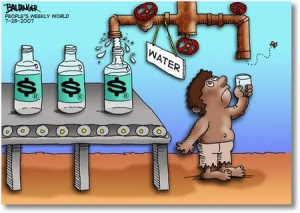Private Prisons Do Not Perform Better Neither Do Private Schools
Efficiency is usually touted when advocating privatization of government functions. The government is wasteful and oftentimes, not really accountable. Free market does have competition on its side. A business that does not keep up with its competitors, a business that does not reinvent itself every so often, a business that does not embrace disruptive innovation, will simply not survive. Not all enterprises succeed. Only half of new firms in the United States survive beyond four years (Business Information Tracking Series, US Census Bureau). Even big firms such as Lehman Brothers Holdings, Washington Mutual, WorldCom, Pacific Gas and Electric Company, have either permanently closed or filed for bankruptcy. Woolworth has been dethroned by WalMart. Borders has closed its doors. This is competition. This is truly the arena of disruptive innovation. Without doubt, there are government functions that can benefit from private entrepreneurship. Even public basic education can, just not in a way some people think. The production of learning materials such as textbooks can potentially add quality while reducing costs if this is assigned to the private sector. Even the food served in a school's cafeteria could be possibly better. One must not confuse these services or goods, however, to public responsibilities.
 |
| Above cartoon copied from Privatization: The Big Joke That Isn’t Funny |
SOLUTION NO. 11 Recognize that public education is a public responsibility, not a consumer good.The above is indeed a necessary reminder. Private enterprises are about cutting costs and maximizing profits. It is true that these objectives sometimes help deliver higher quality products to consumers. It is true that minimizing costs often leads to efficiency and less waste. It is true that private enterprises benefit consumers but privatization of government functions must delineate between goods and responsibilities. In addition, if what is desired is the efficiency that competition brings then privatization of government functions must allow for a free market and not a monopoly. Privatization, for example, of basic services such as sewer and water to a single company does not introduce competition. It should be obvious that a monopoly is likewise not a free market.
To illustrate why privatization of public schools is not a solution, the case for prisons maybe helpful. In the US, several states have enlisted private companies to house inmates. Privatization supposedly promises savings. After several years, there is now evidence. The state of Arizona, for example, has found out exactly what private prisons really are. The following are excerpts from a New York Times article, "Private Prisons Found to Offer Little in Savings":
There’s a perception that the private sector is always going to do it more efficiently and less costly,” said Russ Van Vleet, a former co-director of the University of Utah Criminal Justice Center. “But there really isn’t much out there that says that’s correct.”
Such has been the case lately in Arizona. Despite a state law stipulating that private prisons must create “cost savings,” the state’s own data indicate that inmates in private prisons can cost as much as $1,600 more per year, while many cost about the same as they do in state-run prisons.
The research, by the Arizona Department of Corrections, also reveals a murky aspect of private prisons that helps them appear less expensive: They often house only relatively healthy inmates.
“It’s cherry-picking,” said State Representative Chad Campbell, leader of the House Democrats. “They leave the most expensive prisoners with taxpayers and take the easy prisoners.”The key here to understand why this relates to public education is the statement made by Campbell: "It's cherry-picking. They leave the most expensive prisoners with taxpayers and take the easy prisoners." Applied to education, private schools often cherry-pick via entrance examinations and tuition fees that are beyond the reach of the poor (even with government subsidies). To minimize costs, these schools do not enroll children who have special needs. These schools only enroll children who have been raised in households that have provided good early childhood learning. These schools can also minimize costs by reducing the teaching staff and replacing them with technology. Again, with highly motivated students who have very strong background, no one would really notice a difference between a computer screen and a teacher. This is no different from the privatization of prisons in Arizona.
Comments
Post a Comment